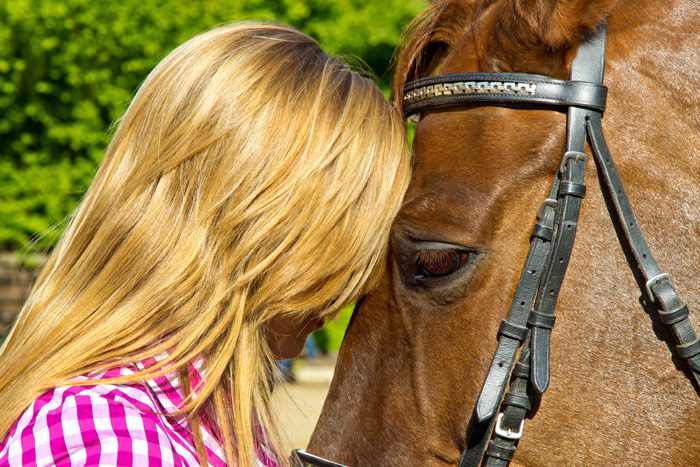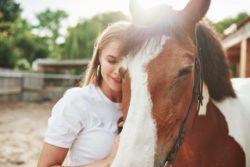When you picture taking the first step toward addiction recovery, you probably imagine nervously sharing your thoughts with a counselor and a room full of other people recovering from substance abuse, not spending time in the great outdoors with one of the world’s most majestic creatures.
Incorporating horses into the therapeutic process to help individuals address various emotional, behavioral, and psychological issues. When combined with refuge services, which typically provide support and shelter to individuals who have experienced trauma or are in crisis, EAP can be a valuable tool in promoting healing and recovery.
Equine-Assisted Psychotherapy with Refuge Services
Equine-assisted Psychotherapy (EAP) is a hands-on therapeutic model that works particularly well for those who’ve had limited success with more traditional forms of substance abuse treatment and feel stuck in the early stages of the recovery process. EAP is also strongly recommended for clients with a history of abuse or trauma and/or a diagnosis of co-occurring disorders such as anxiety, depression, anorexia, bulimia, or PTSD.
Refuge Services is a community-sponsored organization that provides EAP services for those in substance abuse recovery through a partnership with The Ranch at Dove Tree. Refuge Services is a member of the Equine-Assisted Growth and Learning Association (EAGALA). The EAGALA model is evidence-based and involves no horseback riding. Instead, sessions are 100% on the ground, using the horse’s nature as a social animal to teach clients how to build better relationships with themselves and others.
What to Expect from Equine-Assisted Psychotherapy (EAP)
Contrary to popular belief, you don’t have to be an animal lover to benefit from this experiential therapeutic approach. “Since it’s not about horsemanship, it’s absolutely fine if a client has no experience with horses,” Director of Therapy Services Patti Mandrell said. “In fact, most of the people I work with have never been around horses before. We address reservations or concerns as they come up.”
The horses used in EAGALA model therapy sessions aren’t restrained in any way, so they’re free to interact with clients in a natural fashion. Clients may brush or groom the horses, but often they just spend time getting acquainted with the animals and working on building a connection. “We have horses of all ages and personalities,” Mandrell added. “Even horses with disabilities, such as a limp, can be used in this therapy model. They all provide unique opportunities for discussion.”
In a therapy session, horses help clients tell their own life stories. They are a resource and a tool to help those in recovery sort through life’s challenges while finding solutions. “It’s similar to play therapy for children,” Mandrell explained. “Kids might use a sandbox, dolls, and other toys to tell their story or work through their challenges. Equine-assisted Psychotherapy is the adult version of this process, using horses as real life characters in the client’s story.”
Most clients meet once a week for their EAP sessions. “Weekly meetings are generally most effective for people in treatment,” Mandrell said. “They’re working on developing new coping skills throughout the week and these sessions give them a chance to put what they’ve learned into practice. EAP is an interactive therapy that helps in real time, which makes it an excellent complement to other forms of substance abuse treatment.”
How Equine-Assisted Psychotherapy (EAP) Helps Promote Long-Term Sobriety
Horses are much like humans in that they’re adaptable, trainable, and teachable. Equine therapy sessions help clients learn to master the skills they’ll need for long-term sobriety through learning how to best interact with the horses. “The horses help you find your sober self and overcome that fear of not knowing who you really are without drugs or alcohol to turn to when you face challenges,” Mandrell said.
Some of the lessons people in recovery can apply to maintaining long-term sobriety include:
- Identifying patterns in thoughts and behaviors that keep you from moving forward with your goals
- Determining what situations can be controlled and what factors are beyond your control
- Building trust in relationships
- Enhancing creative problem-solving skills
- Valuing empathy, responsibility, and patience
- Becoming comfortable with feelings of vulnerability and uncertainty
- Decreasing feelings of hopelessness
- Increasing feelings of self-confidence and self-worth
If desired, clients who leave The Ranch at Dove Tree can opt to privately continue their sessions with Refuge Services. Mandrell urges clients to continue EAP as long as they find the process to be useful in aiding their recovery. “I’ve grown up with horses, but what I love the most about my job is seeing lives changed,” she said. “The EAGALA model allows me to make a difference by walking clients through their darkest hours. It’s very rewarding.”
Refuge Services’ Equine-Assisted Psychotherapy (EAP) Video:
To learn more about our programs at Ranch at Dove Tree, please contact us today at 806.307.2003.








